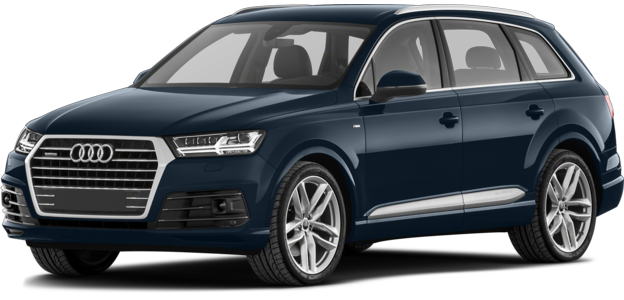
The verdict: Redesigned for 2017, the Audi Q7 is a driver's SUV that emphasizes performance over packaging.
Versus the competition: The Q7 lacks
the visual spectacle, plush ride or outright practicality of certain
three-row luxury SUVs, but it's a dynamic, if expensive, alternative.
The Q7 comes in Premium, Premium Plus and Prestige
trim levels, all with seven seats and all-wheel drive. A 2017 version
goes on sale in early 2016 after skipping the 2016 model year. Compare
the 2015 and 2017 Q7 . I drove Premium Plus and Prestige versions.
Exterior & Styling
Redesigned after a seeming eternity in its first generation, the new Q7 looks more wagonlike than its predecessor, whose body-heavy profile shared platforms with the Volkswagen Touareg and Porsche Cayenne. (Audi and Porsche both are Volkswagen Group brands.) No longer a sibling of the other two, the 2017 Q7 rides a unique platform and looks less imposing overall — a result of taller glass, lower headlights and a squatter, six-sided grille.
Redesigned after a seeming eternity in its first generation, the new Q7 looks more wagonlike than its predecessor, whose body-heavy profile shared platforms with the Volkswagen Touareg and Porsche Cayenne. (Audi and Porsche both are Volkswagen Group brands.) No longer a sibling of the other two, the 2017 Q7 rides a unique platform and looks less imposing overall — a result of taller glass, lower headlights and a squatter, six-sided grille.
Thanks to a lot more aluminum, which is lighter than
steel, the Q7 is also about 250 to nearly 500 pounds lighter than its
ponderous predecessor, depending which trim you compare. But at 4,938
pounds, the new Q7 is still heavy. (An all-wheel-drive 2016 Acura MDX is
some 700 pounds lighter.)
Xenon headlights, LED daytime running lights and
19-inch alloy wheels are standard. Full-LED lights are optional, as are
20- and 21-inch rims.
How It Drives
The Q7 boasts decent straight-line performance, and it shines on serious curves — no doubt to the dismay of any kids in back. The SUV's sole drivetrain as of launch is a supercharged 3.0-liter V-6 that's good for 333 horsepower. After a moment of initial accelerator lag, it revs strongly and hard. Even with three adults on board, our test car had sufficient reserves to pass slower highway traffic and conquer steep uphill grades. Audi estimates the Q7 hits 60 mph in just 5.7 seconds, a time that rivals many compact sport sedans.
The Q7 boasts decent straight-line performance, and it shines on serious curves — no doubt to the dismay of any kids in back. The SUV's sole drivetrain as of launch is a supercharged 3.0-liter V-6 that's good for 333 horsepower. After a moment of initial accelerator lag, it revs strongly and hard. Even with three adults on board, our test car had sufficient reserves to pass slower highway traffic and conquer steep uphill grades. Audi estimates the Q7 hits 60 mph in just 5.7 seconds, a time that rivals many compact sport sedans.
The Q7's eight-speed automatic transmission is a plus,
shifting smoothly and quickly enough to go unnoticed. In an age where
gear-laden transmissions often obstruct performance, an eight-speed that keeps to itself is a good thing.
Like in so many cars, a dashboard button selects from a
few modes that vary driving characteristics. The sportiest mode,
Dynamic, cuts a lot of power-steering assist and introduces much sharper
accelerator progression, though the initial lag persists. Still, if you
barrel around hairpin turns in Dynamic mode, the Q7 excels. The
steering is direct and lively, the chassis charges through corners with
little body roll, and the tires — chunky Goodyear Eagle Sport P285/45R20
all-seasons on our test cars — have carlike grip. The brakes deliver
fade-free stopping power all day long, and the transmission resists any
untimely shifts heading into corners. Coming out of the corner, the
engine's broad torque curve (325 pounds-feet from 2,900 to 5,300 rpm)
hustles the Q7 back up to speed even if you're a gear too high.
We'll need to test a Q7 on rougher roads to issue a
final verdict on ride quality, but my early impression is that the SUV's
standard suspension with conventional steel springs is firm but
livable. It's not choppy, as the similarly configured 2016 Volvo XC90
can be. The Q7's base 19-inch wheels have higher-profile tires
(P255/55R19s), which could soften ride quality, as well.
Shoppers who want more ride comfort should consider
the Q7's optional adaptive air suspension, which eliminates some of the
bounciness over rapid elevation changes and improves general isolation.
It makes for a refined experience that complements the SUV's overall
quietness. For outright comfort, though, the XC90's optional — and
exceptional — air suspension has Audi beat.
If you want more comfort without stepping up to an air
suspension, the Acura MDX, Buick Enclave and Infiniti QX60 all ride on
the softer side.
Towing capacity is now 7,700 pounds when equipped with
a $550 tow package, up 1,100 pounds versus the prior Q7. EPA
certification is still pending as of this writing, but Audi estimates
the Q7 will get 21 mpg in combined city/highway driving, with premium
gas recommended but not required. That's generally competitive with the
segment, though if you don't need all-wheel drive, a front-drive MDX
gets as high as 23 mpg combined.
Read more at http://www.cars.com/audi/q7/2017/expert-reviews#Aoox5Q8fYGGgalPm.99
No comments:
Post a Comment